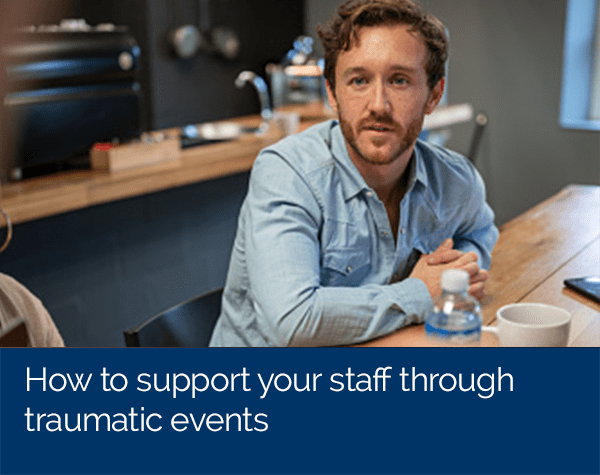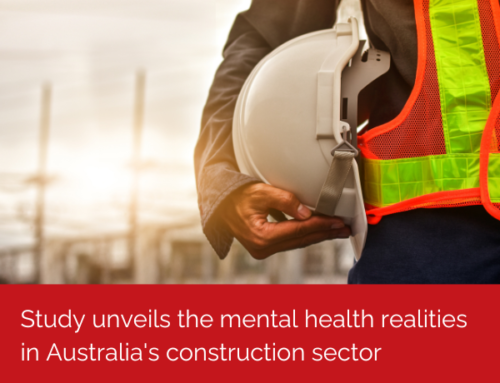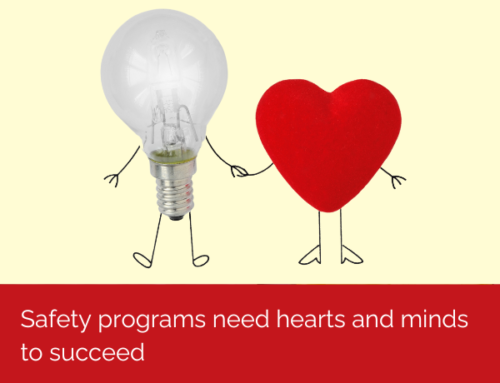
For many, the past few years have been rough. Between natural disasters in Australia, the impact of the pandemic globally and locally, or inflation impacting the cost of living, many workplaces are dealing with staff directly or indirectly impacted by trauma emanating from these events.
As a colleague or supervisor, what can you do support workmates dealing with trauma?
Everyone deals with trauma differently.  There is no right way .  Some will want to talk about it whilst others won t.  Some find it difficult to focus or will withdraw, while others are all talk. Some are emotional whilst others behave just like they did before the events. What is common to all is what they ll need from you as their workmate or Manager.
Listen
Truly listen. This is not interrupting them with your own view on what has happened, cutting them short or telling them how they should be feeling, for example, âaren t you angry at those darn politiciansâ? It is not about making them feel their reaction is wrong or making them talk about it if they don t want to.
Listening is being present in the moment with them. Â Listening is letting them share what they wish to (or not). Listening is letting them express as little or as much as they wish. Â Listening is not judging. Â Listening is accepting a perspective and allowing them to share. Â Whatever their reaction, remind yourself they are having a very normal response to a very abnormal and traumatic event, and let them express what and how they feel in a way appropriate to them.
For some tips on becoming a better listener, see Listen up! Eight essential listening skills for leaders.
Acknowledge
âI used to think the worst thing in life was to end up all alone. It s not.
The worst thing in life is to end up with people that make you feel aloneâ.
Robin Williams
Acknowledge how they feel. When you acknowledge how someone feels they feel supported and not alone. Statements such as âI can t imagine how frightened you would have beenâ are appropriate. Everyone will feel differently as everyone s experience is different sad, angry, frightened, scared or frustrated empathise and acknowledge their feelings and accept their reaction as just that their unique reaction.
The worst thing you can do is tell them how they should be feeling or what you think they should do to fix or get relief from the situation. They won t feel listened to or heard. When you are present, listen deeply and acknowledge how they feel they will feel heard and supported and most importantly, not alone.
Support
Know the difference between listening and acknowledging vs counselling. Â As a Manager or work colleague, it is not our role to provide counselling at work. Â Rather, our role is to support people the best way we can, and when it comes to the psychological side of dealing with trauma, this support includes encouraging them to seek professional support.
Never attempt to provide counselling to others unless you are qualified to do so. Â Why? Â Trauma is a tricky topic to integrate and process, and you may do more harm than good if you venture into this territory (even with the best intent) without the skills and knowledge to truly help. Â Also, the workplace is often a refuge for people experiencing trauma and to blur boundaries by attempting to help them process emotion at work, can have countless side effects.
Your role is to listen, acknowledge and support. This support may include referrals to a professional and often practical help such as flexible work hours or working from home, time off, food, clothing or housing or perhaps reduced workloads.  These supports are needed, and wanted and will show you care without venturing into territory where you are not qualified to offer advice.
Listen  acknowledge  support. Three simple steps will make a huge difference.
You may also be interested in exploring this supporting article: Navigating the difference between wellbeing and wellness at work.
Where you or your staff can get support
Lifeline
13 11 14
Lifeline provides free, 24-hour Telephone Crisis Support service in Australia. Volunteer Crisis Supporters provide suicide prevention services, mental health support and emotional assistance, not only via telephone but face-to-face and online.
Beyond Blue
1300 22 4636
Beyond Blue is an Australian independent non-profit organisation working to address issues associated with depression, suicide, anxiety disorders and other related mental disorders
Embrace Multicultural Mental HealthÂ
(02) 6285 3100
A national platform for multicultural communities and Australian mental health services to access resources, services and information in a culturally accessible format.
Headspace
1800 650 890
Free online and telephone service that supports young people aged between 12 and 25 and their families going through a tough time.







